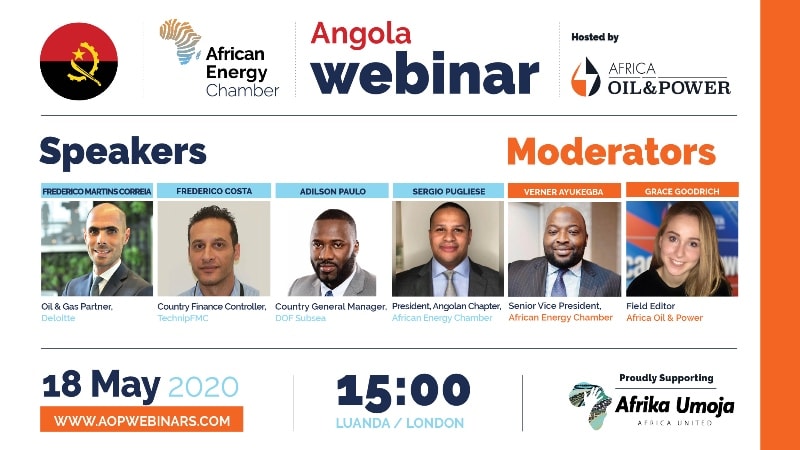- Africa Oil & Power, together with the African Energy Chamber, hosted a public webinar where industry leaders unpacked strategies to set Angola on its 2021 growth trajectory.
- The webinar was comprised of a brief presentation and 70-minute moderated panel discussion featuring upstream-, downstream- and service-related topics, followed by a Q&A session with members of the audience and press.
- As Africa’s second largest producer of oil, standing at 1,4 million barrels per day pre-COVID-19, Angola is one of Africa’s key players in the petroleum sector.

As the Angolan and global oil and gas industry faces unprecedented financial, logistics and safety challenges induced by COVID-19, Africa Oil & Power, together with the African Energy Chamber, presented a public webinar presented a public webinar under the theme ‘Mitigating COVID-19: Preserving Angola’s Momentum for 2021, on Monday in which industry leaders united to generate survival strategies for 2020 and reset Angola on its path to growth for 2021. The panel was comprised of Sergio Pugliese, President, Angolan Chapter, African Energy Chamber; Frederico Martins Correia, Oil & Gas Partner, Deloitte; Frederico Costa, Country Finance Controller, TechnipFMC and Adilson Paulo, Country General Manager, DOF Subsea.
Local content was a key topic of the discussion as the country’s energy sector has made immense progress in the last few years in terms of increasing local capacity and involving nationals and local companies in the petroleum sector. According to Frederico Martins, although unfortunate, the COVID-19 pandemic has been a local content enabler, for the time being: “From a local content perspective, this crisis is an opportunity to continue efforts and to have more people engage with the industry to perform key tasks such as operation maintenance in the upstream space.”
Frederico Costa, from TechnipFMC expressed the government’s will to push local content while recommending patience. “We have seen a lot of support from the ministry and I believe COVID-19 will push the local content issue. However, we must understand that this process takes time. An efficient know-how process can take between 10 to 15 years. We must be patient but determined.”
Furthermore, he expressed that Angola has not been the hardest hit by the crisis as the government and the private players have managed to delay projects rather than cancel them: “Angola made important fiscal reforms at the beginning of 2018 of which we saw positive signs earlier this year. Most importantly, the National Bank of Angola liberalized foreign exchange currency, thus drastically increasing financial flows in the oil sector in particular. Of course, these levels have dropped since the beginning of the crisis. Companies are reviewing their capital expenditure costs and reducing risks. Thankfully, most projects in Angola have been delayed, but not cancelled, which is a very important feature and must be a tool for the Angolan government to promote its oil and gas sector.”

Mitigating the decrease in oil production is a priority of Angola’s National Development Plan (PND), which is built around the government’s economic priorities. According to Sergio Pugliese, “The PND and COVID-19 together are opportunities for companies to create leaner models, transition to more efficiency to absorb potential shocks to the market. The key is removing the unpredictability as it will give us an opportunity to better manage and plan.”
Although indigenous companies don’t yet have the financial power and resources to compete with oil producers, Adilson Paulo concluded that the first step is increased involvement in the services sector: “Today, the supply chain of key industries like oil and agriculture are outside the country. The fuel we use and the food we eat comes from outside. In order for us Angolans to create local business opportunities, we need to local at the supply chains and find ways to fill the gap. Let’s have Angolans more and more involved in the local services to oil and gas companies. That’s the first step to local content.”

